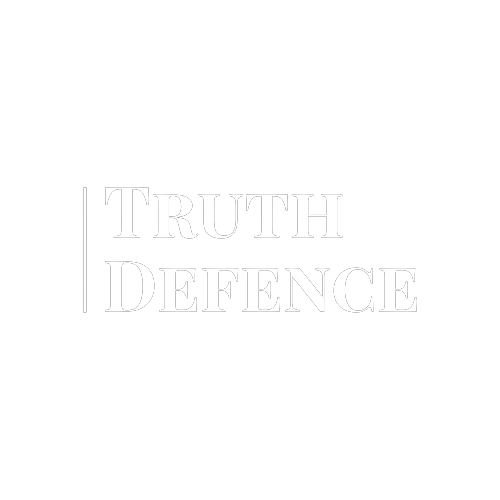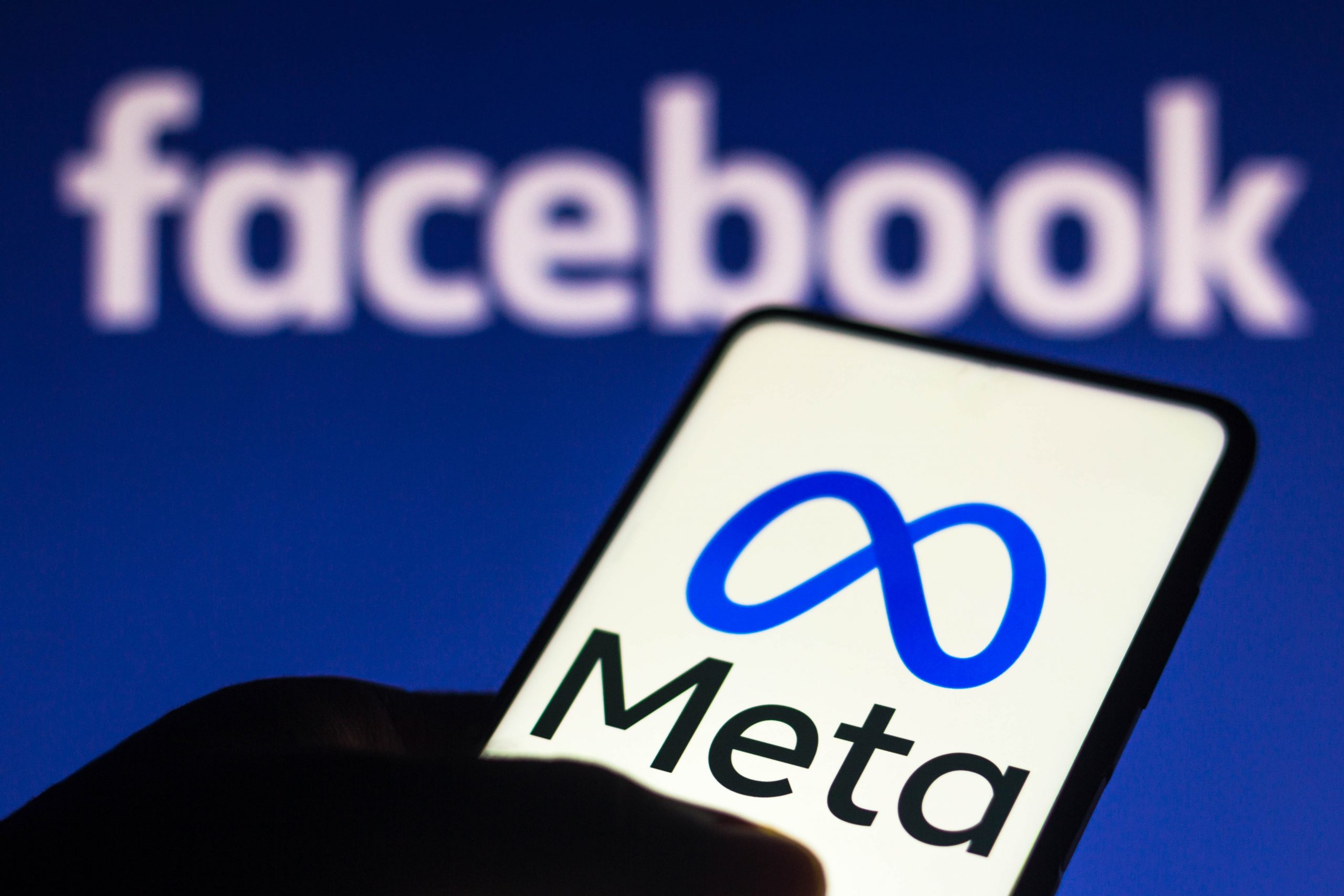Earlier this month the Palestinian death roll reached a seven year high amidst intensifying Israeli violence against Palestinians in the West Bank, leading up to the 1 November election. In Nablus, settler attacks have taken place under the protection of the Israeli army, 420,000 Palestinians have had their movements restricted by being blockaded and prevented from returning to their homes. At checkpoints, Israeli forces routinely search Palestinians and their cars and there are increasing reports of Israeli soldiers demanding access to social media accounts, where many Palestinians have been documenting the violence.
Fear of being found with content that could be interpreted as ‘pro-Palestinian’ or ‘anti-Israeli’ is meant to deter Palestinian people from documenting their experiences. In June 2021, a 16-year-old boy was interrogated about a TikTok video that showed him mocking Israeli soldiers. He was then beaten and left with a minor head injury.
However the ‘digital apartheid’ involving the censorship of Palestinian citizens, activists, human rights advocates and media outlets goes far beyond the actions of Israel’s occupying forces and has become all too common across social media platforms including Meta-owned Facebook, Instagram and WhatsApp.
Last week, Instagram briefly suspended the account of Eye On Palestine, one of the most well-known multilingual accounts on the platform with over three million followers, for breaching “community guidelines”. In a statement released in response to the suspension, Eye On Palestine said “The cyber crackdown of Palestinian political expression echoes the same repression on the ground; our reporting is policed, persecuted and even criminalised.”
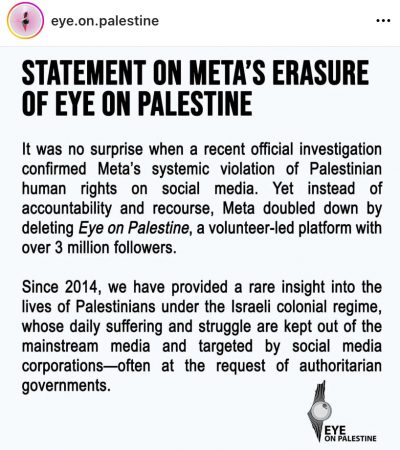
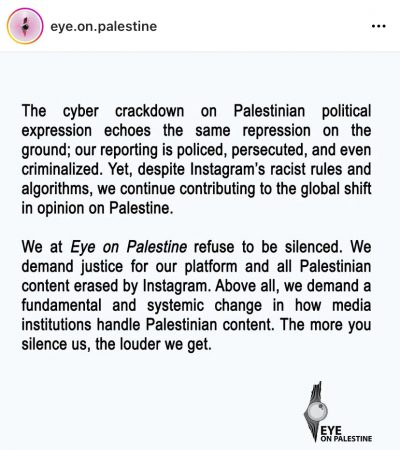
Meta’s policies on Palestine
The suspension comes a month after an internal report into the impact of Meta’s policies during the violence in Palestine in May 2021 found that Meta had violated Palestinian human rights during the siege on Gaza:
“Meta’s actions in May 2021 appear to have had an adverse human rights impact on the rights of Palestinian users to freedom of expression, freedom of assembly, political participation, and non-discrimination, and therefore on the ability of Palestinians to share information and insights about their experiences as they occurred.”
The report found that Meta’s policy on ‘Dangerous Individuals and Organisations’ – which has led to the proactive removal of accounts and posts across Meta’s platforms including the recent suspension of Eye on Palestine – focuses mainly on Muslim accounts and therefore disproportionate impacts Palestinians. The report found that Meta did not enforce its own moderation policies equally and that it lacked staff who understood the region’s language, culture and history.
The report made several recommendations which includes the review of internal policies, a more proportionate strike system as well as better transparency so that “users can better understand and abide by the policies”. However the report fails to mention the inherent bias within its policies and on its Oversight Board
In May 2021, an investigation by The Intercept revealed that Meta had specific rules relating to how it moderates the term ‘Zionist’, which have been in place since 2019 and resulted in the suppression of criticism of Israel during a wave of Israeli human rights abuses on Palestinians in Gaza. In addition, in 2020 Meta appointed Emi Palmor, the former Director General of the Israeli Foreign Ministry, to its Oversight Board. The board, which was created in 2019 and began operations in Spring 2020, is a “independent body” that takes binding decisions on whether “to uphold or reverse Facebook’s content decisions.” The board’s website states that “when fully staffed, the board will consist of 40 members from around the world that represent a diverse set of disciplines and backgrounds.” Palmor was also a member of the Israel Land Authority, a government body that forcibly removes Palestinians from their homes. There are currently no Palestinian members on the board.
Recent human rights abuses
In May 2022 rights groups and activists raised concerns when Meta began to suspend accounts and remove posts that mentioned the eviction of Palestinian people from their homes in Seikh Jarrah. It was particularly noticeable that Instagram stories with the hashtags #SaveSeikhJarrah were being removed on mass. One of the most prominent accounts that was disabled was that of Palestinian activist Muna el-Lurd, a journalist and Seikh Jarrah resident with 1.6 million followers, who had been providing daily coverage. In addition her brother Mohammed el-Kurd, a Palestinian writer and poet, also had his account suspended. In September 2021, the siblings made it to the list of Time’s 100 Most Influential People, credited with “provided the world with a window into living under occupation in East Jerusalem —helping to prompt an international shift in rhetoric in regard to Israel and Palestine.”
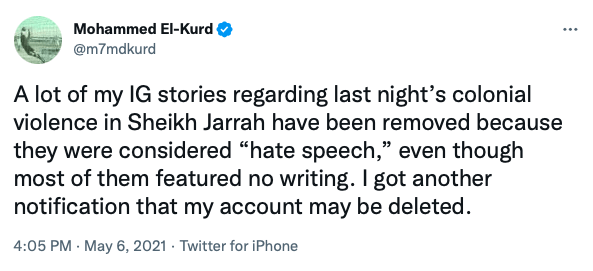
In a statement, Instagram claimed that the removal of stories and accounts was because of a “widespread global technical issue not related to any particular topic”. Yet in January, as the Salhiya family faced imminent eviction from their home in Seikh Jarrah and Israeli forces prevented journalists and UN workers from entering, Instagram blocked Muna el-Kurd from live streaming the events as they unfolded.
Then in August, during Israel’s bombardment of the Gazan strip that resulted in the death of 17 children, Palestinian Facebook and Instagram users documenting the attacks on their neighbourhoods noticed an abrupt and systematic removal of their content. It was also reported that Palestinian journalists were “pushed off” social media and both Facebook and WhatsApp were accused of blocking the accounts of Gazan journalists reporting on civilian deaths. Freelance journalist Omar Abu Nada told SKeyes “I posted a number of photos detailing the civilians killed by Israeli forces in the Gaza Strip on 17 August. They then accused me of breaching their publishing standards…. But the real reason is clear: it’s about cleansing their platforms of Palestinian content.”
In the same month, following a raid in Nablus by Israeli occupation forces that killed three Palestinians, Facebook systematically removed posts that referenced the killings. One such post bore the caption “How many times do Gazans have to pull their loved ones – alive or dead – from under the rubble?”
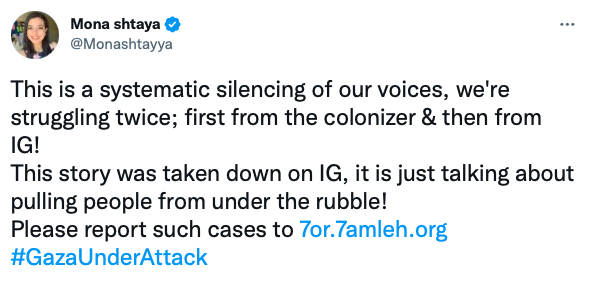
In September, Meta-owned WhatsApp was accused of “purging” Palestinian activists and journalists from the messaging platform again. It has been reported by the Israeli press that WhatsApps co-founder and former CEO Jan Koum, has poured “millions” into anti-BDS causes as well as recently “to AIPAC’s efforts to get pro-Israel Democrats elected in the upcoming [US] mid-term elections.” Several accounts were restored after it emerged that senior Palestinian officials had been amongst those removed from the app and the Palestinian communications ministry became involved.
A quarterly report from 7amleh covering the period July to September 2022 identified 421 violations by social media companies and found that:
“The last Israeli agressive attack against Gaza strip, which lasted from 5 to 7 August, revealed the significant extent of censorship practiced by social media companies on Palestinian political content. They removed hundreds of Palestinian accounts and content publications as a result of revealing and criticizing the Israeli attacks against Gaza.”
The report revealed that at least 221 accounts were restricted or removed by social media companies, with Meta owned Facebook and Instagram having the highest number of violations, followed by Twitter. Activists and every day citizens were the worst affected, followed by journalists and human rights advocates. 7amleh has followed up on 388 violations and 132 are still under consideration.
